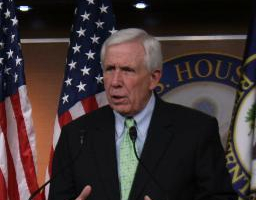H.R. 1150 or the Frank R. Wolf International religious Freedom Act was just signed by President Barack Obama in an effort to further strengthen the United States effort to protect from persecution religious minorities all over the world.
Senator James Lankford, a Republican from Oklahoma, who co-sponsored the bill said in a statement, "Religious freedom is more than an American right; it is a human right. The Frank Wolf International Religious Freedom Act is needed to help prevent the persecution of religious minorities around the world, and I am pleased that the President has signed it into law. As a world leader for freedom and the protection of basic human rights, the United States should take every opportunity to advocate for people to think, believe, and act according to their religious belief, whether they belong to a minority or majority religion."
Another co-sponsor of the bill, Rep. Chris Smith (R-N.J.) said that all over the world, America has been witnessing the global problem of religious persecution. The IRFA signing came in the time that there was a bombing in a Coptic Christian church in Cairo, Egypt which killed 24 people, most of them women and children.
The bill was named after the Honorable Frank Wolf, who had represented the 10th congressional of Virginia since 1981. He has since retired but Wolf, as reported by The Christian Post, is widely known as a defender of human rights and religious minorities.
H.R. 1150 is actually an update of an existing law which was signed in 1998 by then president Bill Clinton. Through the bill, which was sponsored by Wolf, the office for the Ambassador-at-Large of the International Religious Freedom at the State Department was established.
The update to the bill will improve the effectiveness of promoting religious liberty through the following:
- Elevates the Ambassador-at-Large for International Religious Freedom so he reports directly to the Secretary of State;
- Calls for the integration of international religious freedom into the foreign policy of the US;
- Provides for mandatory religious freedom training of foreign service officers, with curriculum being developed by the Ambassador-at-Large;
- Provides for coordination between the Ambassador and the National Security Council; and
- Provides for the designation of non-state actors as countries of particular concern.
The update to the bill has been received well by several religious leaders such as Russell Moore, president of the Ethics and Religious Liberty Commission, who says that the legislation is "a vital step toward protecting conscience freedom for millions of the world's most vulnerable, most oppressed people."

















